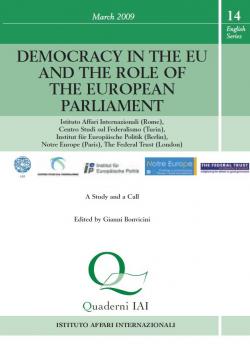Democracy in the EU and the Role of the European Parliament. A study and a call
How to make the process of European integration more legitimate is the question posed by this book. In other words, how to fill the political/institutional void left by the protracted ratification process of the Treaty of Lisbon and how to recreate a strong political linkage between voters and European institutions. In view of the upcoming 2009 EP elections, five institutes, the Istituto Affari Internazionali (coordinator, Rome), Centro Studi sul Federalismo (Turin), Institut für Europäische Politik (Berlin), Notre Europe (Paris) and The Federal Trust (London), in cooperation with Tepsa and EUCONSENT, both networks of research centres in Europe, have joined to carry out a study on this crucial topic. The main aim of the initiative was not only to launch (once again) the proposal that European political parties nominate candidates for the post of President of the European Commission, but also to advocate that the European Parliament play a more crucial and central role, in terms of both exercising its power and undertaking inter-institutional dialogue.
Una versione in italiano del quarto capitolo è stata pubblicata come "I partiti politici europei e la candidatura del Presidente della Commissione" (Documenti IAI ; !5|03).
-
Dati bibliografici
Roma, Istituto Affari Internazionali, marzo 2009, 72 p. -
Numero
14
Preface, Gianni Bonvicini
Give European Citizens a Voice, Tommaso Padoa-Schioppa
Seminar participants
List of Acronyms
1. Making Better Use of the European Parliament’s Powers, Franco Mosconi and Antonio Padoa-Schioppa
1. The EP’s Evolution (1957-2000)
2. More Powers with the Lisbon Treaty
3. Towards a Better Use of Powers inside the Treaties
4. Future Reform
Bibliography
2. European Political Parties and Democracy in the EU, Brendan Donnelly and Mathias Jopp
1. The Nature and Role of European Political Parties
2. The Successive Strengthening of the European Political Parties through Primary and Secondary Law before the Lisbon Treaty
3. Political Parties and the Lisbon and Constitutional Treaties
4. The Central Role of European Political Parties
Bibliography
3. The Role of European Electoral Programmes, Francisco Roa Bastos
1. What is a Euromanifesto And Why Does it Matter?
2. The Insufficient Definition of Euromanifestos
3. National Parties and Euromanifestos during the 2004 European Electoral Campaign
4. Parliamentary Coordination and Legislative Work as a Manner to Define Concrete Policy Programmes
5. Towards More Effective Euromanifestos
Bibliography
Appendix
4. Should European Parties Propose a Candidate for European Commission President?, Gianni Bonvicini, Gian Luigi Tosato and Raffaello Matarazzo
1. The Crisis of the Institutional Reform Process
2. Reasons for the Crisis
3. An Increase of ‘Political Responsibility’ for the President of the Commission
4. The Aim of the Proposal
5. The Centrality of the European Citizen
6. Difficulties to Overcome
7. The Need for a Greater Democratic Legitimation of the EU
Bibliography
Tema
Tag
Contenuti collegati
-
Pubblicazione16/08/2015
I partiti politici europei e la candidatura del Presidente della Commissione
leggi tutto -
Pubblicazione12/08/2015
I partiti politici europei e la candidatura del Presidente della Commissione
leggi tutto -
Ricerca02/11/2014
Come coinvolgere i cittadini europei nel processo di integrazione: analisi e proposte in vista delle elezioni del Parlamento Europeo
leggi tutto




